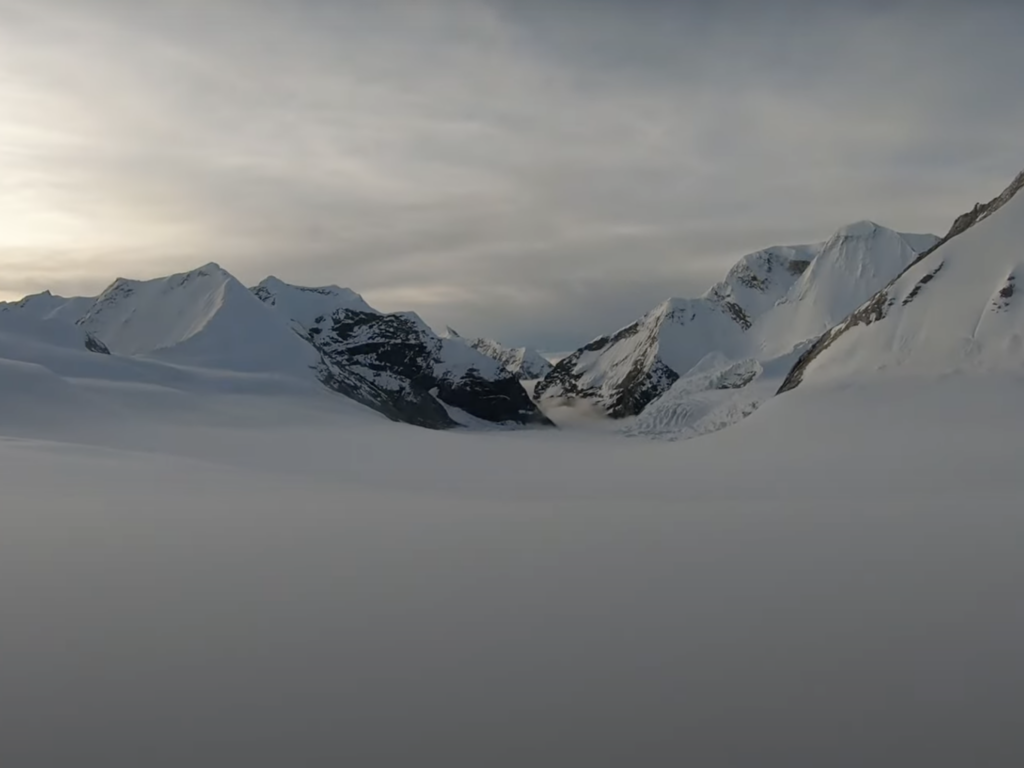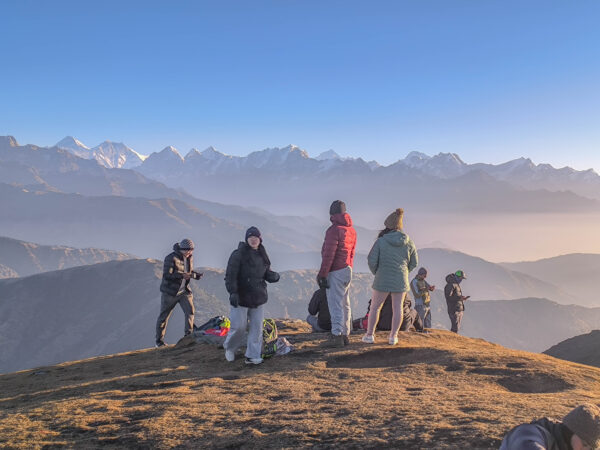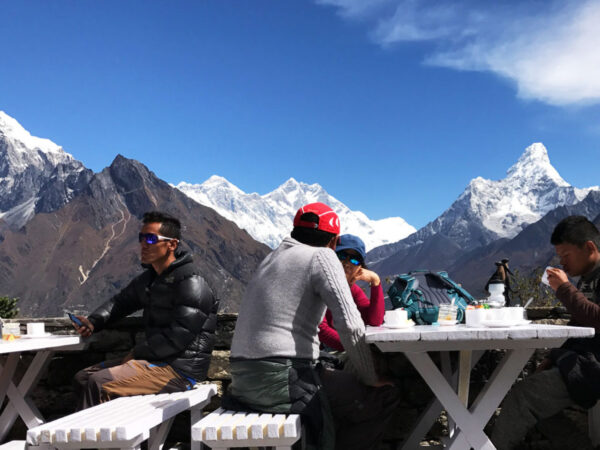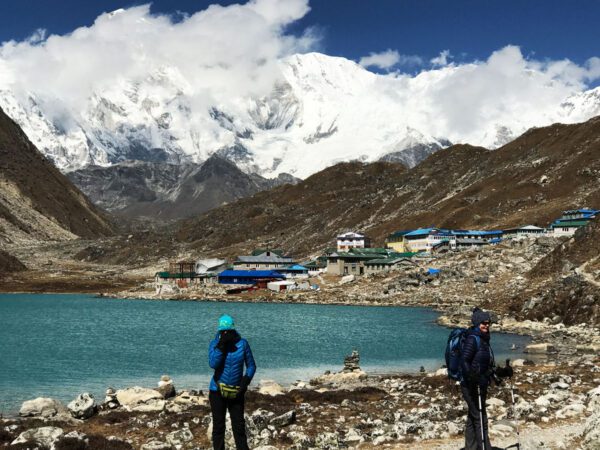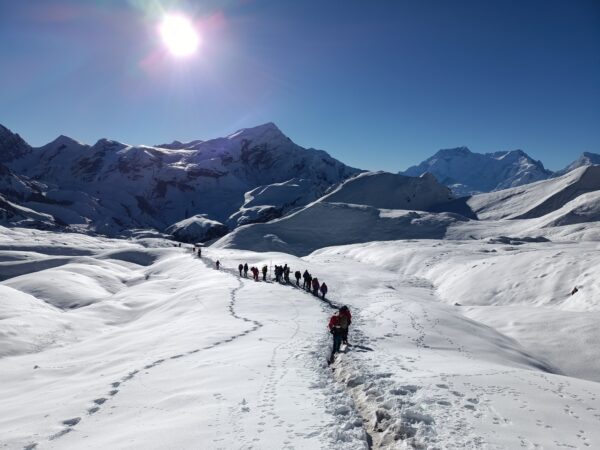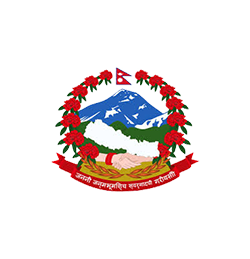Why us?
- Expertise & Experience
- Personalized & Flexible Itineraries
- Local Native Guides
- Competitive Pricing Without Compromising Quality
- Guaranteed Departure
- Top-notch Service
- Hassle-Free Permits & Logistics
- Small Groups for a Better Experience
- Safety First Approach
- Eco-Friendly & Sustainable Travel
- Exceptional Customer Service
- Community Support & Ethical Tourism
Highlights
- Cultural Immersion in Kathmandu: Explore UNESCO sites like Boudhanath Stupa, Pashupatinath Temple, and Patan Durbar Square.
- Scenic Flight to Tumlingtar: Witness aerial views of Everest, Makalu, and Kanchenjunga during the thrilling mountain flight.
- Remote Makalu Barun National Park: Trek through pristine rainforests, terraced fields, and Sherpa villages like Tashi Gaon—the last settlement before Makalu Base Camp.
- Sherpani Col Pass (6,150m) & West Col: Conquer two high-altitude passes using fixed ropes, with panoramic views of Chamlang, Baruntse, and Hunku Glacier.
- Makalu Base Camp (4,870m): Stand at the foot of the world’s 5th highest peak (8,485m), surrounded by glacial ponds and towering Himalayan giants.
- Sacred Shivadhara Waterfall: Visit the mystical Shivadhara (4,310m), a sacred site where pilgrims bathe under a cascading cliffside spring.
- Panch Pokhari (Five Lakes): Discover the serene glacial lakes of the Hinku Valley, framed by snow-capped peaks like Ama Dablam.
- Amu Lapcha Pass (5,850m) Crossing: Navigate a technical, roped descent into the Everest region, with jaw-dropping vistas of Lhotse and Island Peak.
- Tengboche Monastery: Meditate at the spiritual heart of the Khumbu, surrounded by 360-degree views of Everest, Ama Dablam, and Nuptse.
- Cultural Farewell in Kathmandu: Celebrate your journey with a traditional Nepali dinner and cultural dance performance.
- Unique Biodiversity: Spot rare flora/fauna in Makalu Barun National Park, including red pandas, Himalayan thars, and rhododendron forests.
- High-Altitude Wilderness: Camp in remote locations like Swiss Camp (5,150m) and Langmale Kharka (4,410m), far from crowds.
- Sherpa & Local Interactions: Engage with Sherpa communities in Tashi Gaon and Namche Bazaar, learning about their traditions and mountain lifestyles.
- Diverse Landscapes: Traverse subtropical forests, alpine meadows, glacial moraines, and rugged Himalayan valleys in one epic journey.
- Bucket-List Achievement: Complete one of Nepal’s most challenging and least-traveled treks, combining Makalu, Everest, and three high passes.
Overview
The Makalu Base Camp and Sherpani Col Pass Trek is one of the most demanding and adventurous trekking routes in Nepal, combining the raw beauty of the Makalu region with the iconic landscapes of the Everest region. Known for its extreme remoteness and technical challenges, this trek is perfect for experienced trekkers seeking an off-the-beaten-path expedition across some of the highest passes in the Himalayas.
This epic journey begins with a trek to Makalu Base Camp, offering stunning panoramic views of Mt. Makalu (8,485m), the world’s fifth-highest mountain. As the route progresses, it presents high-altitude challenges that require proper acclimatization, excellent physical fitness, and basic mountaineering skills. Trekking gear like ice axes, crampons, and harnesses is essential, especially for glacier crossings.
The highlight of this trek includes crossing three of the highest and most dramatic passes in Nepal:
- Sherpani Col (6,150m)
- West Col (6,143m)
- Amphu Labtsa Pass (5,800m)
From these rugged mountain passes, trekkers are rewarded with spectacular views of Mt. Ama Dablam (6,814m), Chonku Peak (6,830m), Cho Polu (6,734m), Island Peak (6,189m), Kang Tega West, and Kang Tega East.
After successfully navigating the Amphu Labtsa Pass, the trail descends toward Chhukung, nestled in the Everest region near the Imja Tse Glacier. The final leg of the trek follows the classic Everest trail, passing through Sherpa villages like Pangboche, Phortse, and the bustling Namche Bazaar, before concluding at Lukla.
Along this section, trekkers will enjoy unforgettable vistas of Mt. Everest, Lhotse, Ama Dablam, and the picturesque Sherpa settlements that offer a deep insight into Himalayan culture.
Makalu Base Camp and Sherpani Col Pass Trek Difficulty & Physical Demands
The Makalu Base Camp Sherpani Col Pass Trek stands out as one of the most challenging and technical trekking adventures in Nepal. This expedition spans over 20 days, leading trekkers through some of the most remote and rugged landscapes, including three high Himalayan passes—Sherpani Col (6,150m), West Col (6,143m), and Amphu Labtsa Pass (5,800m)—all of which soar above 5,000 meters.
Trekking this route is not for beginners. It requires a high level of physical endurance, mental resilience, and basic mountaineering knowledge. The trail features varied terrains, glacier crossings, and prolonged exposure to high altitudes, where altitude sickness becomes a serious concern. Trekkers should monitor symptoms such as headaches, nausea, or dizziness and respond promptly by informing guides or fellow trekkers. Travel insurance that covers emergency evacuation and high-altitude trekking is strongly recommended.
Unlike mainstream routes such as Everest Base Camp or Annapurna, the Makalu Sherpani Col Pass Trek passes through isolated regions with very limited services. After Tashigaon, there are no tea houses or settlements, meaning trekkers must be self-sufficient and carry enough food, water, and camping gear.
Despite its extreme challenges, this trek does not involve summiting Mount Makalu itself. Instead, it’s about reaching Makalu Base Camp and crossing some of Nepal’s most dramatic high passes. With the right preparation and by following our expertly designed itinerary, you’ll be able to complete the journey safely and enjoyably.
We at Everest Hikes recommend building stamina with pre-trek training such as jogging, swimming, gym workouts, or day hikes. You should be comfortable walking 6–8 hours daily with a loaded daypack. In return, you’ll experience one of the most remote and rewarding trekking adventures in Nepal.
Best Time for the Makalu and Sherpani Col Pass Trek
The ideal trekking seasons for the Sherpani Col route are spring (April–May) and autumn (October–November). These months provide the most stable weather, clear skies, and stunning mountain views.
Autumn (October – November)
- The best season for the trek
- Crystal-clear views of Everest, Makalu, and surrounding peaks
- Dry, stable trails and minimal risk of landslides
- Daytime temperatures are pleasant, while nights can be cold with potential frost
Spring (April – May)
- Lush greenery, rhododendron blooms, and vibrant wildflowers
- Occasional snow at higher altitudes, especially early in the season
- Excellent visibility and fewer trekkers compared to autumn
Why Avoid Monsoon and Winter?
While the Makalu region remains beautiful year-round, the monsoon (June–September) and winter (December–February) seasons pose several risks:
- Monsoon brings heavy rainfall, landslides, slippery trails, leech infestations, and flight delays between Kathmandu and Tumlingtar.
- Winter brings extreme cold and heavy snowfall, often blocking high passes and making the route inaccessible.
Makalu Base Camp and Sherpani Col Pass Trek Permits
To embark on this high-altitude adventure, trekkers are required to secure the following permits:
- TIMS Card (Trekkers’ Information Management System)
- Makalu Barun National Park Entry Permit
- Sagarmatha National Park Entry Permit
- Pasang Lhamu Rural Municipality Entrance Fee
All required permits are included in our comprehensive trek package at Everest Hikes. We handle all documentation and processing, so you can focus on your adventure.
Accommodation on the Makalu Base Camp and Sherpani Col Pass Trek
During your stay in Kathmandu, you’ll be accommodated in comfortable 3-star standard hotels on a twin/double sharing basis. If you prefer single occupancy or wish to upgrade to a more luxurious hotel, we can arrange it at an additional cost with prior notice.
Along the Makalu trail up to Makalu Base Camp, accommodation will be in simple trekking lodges and teahouses. These are basic setups that typically include a wooden bed, mattress, pillow, and blanket, usually on a twin-sharing basis. Beyond Makalu Base Camp, the trail enters a remote and uninhabited region where permanent settlements do not exist. From this point onwards, we shift to full camping, staying in tents from Makalu Base Camp to the Amu Lapcha Base Camp. Once we descend to Chhukung, the trek resumes with overnights at cozy mountain teahouses.
Meals on the Makalu Base Camp and Sherpani Col Pass Trek
As the Makalu Sherpani Col Pass route passes through isolated and high-altitude areas, meal options are limited, especially in the higher reaches. Until we reach Makalu Base Camp, meals will be served at the lodges, with a set menu offering local dishes. A staple meal on the trek is Dal Bhat — a traditional Nepali dish consisting of rice, lentil soup, and seasonal vegetables — typically served for lunch and dinner.
From Makalu Base Camp onward, during the camping phase of the trek, all meals will be freshly prepared by our experienced trekking cooks. These nutritious meals are designed to keep your energy levels high in the demanding terrain. After crossing the high passes and reaching Chhukung, meals will once again be served at teahouses.
Outline Itinerary
Day 1: Arrival in Kathmandu – Gateway to the Himalayas- (1,400m)
Day 2: Kathmandu Sightseeing – Cultural & Historical Exploration (1,400m)
Day 3: Fly to Tumlingtar & Drive to Num – Into the Makalu Region (1,560m) – 45 min flight
Day 4: Trek to Seduwa – Enter Makalu Barun National Park (1,540m) – 5–6 hrs
Day 5: Trek to Tashi Gaon – Sherpa Village Immersion (2,070m) – 4–5 hrs
Day 6: Trek to Khongma Danda – High-Altitude Ascent (3,560m) – 6–7 hrs
Day 7: Trek to Mumbuk/Dobato – Crossing High Passes (4,216m) – 6–7 hrs
Day 8: Trek to Yangli Kharka – Barun Valley Trails (3,615m) – 5–6 hrs
Day 9: Side Trip to Shivadhara – Sacred Waterfall Exploration (~4,200m) – 5–6 hrs
Day 10: Trek to Langmale Kharka – Alpine Wilderness (4,410m) – 5–6 hrs
Day 11: Trek to Makalu Base Camp – Journey’s Highlight (4,870m) – 5–6 hrs
Day 12: Trek to Swiss Camp – Glacial Terrain (~5,200m) – 4–5 hrs
Day 13: Acclimatization at Swiss Camp – Rest & Adapt (~5,200m)
Day 14: Trek to Sherpani Col Base Camp – Preparing for the Pass (~5,700m) – 4–5 hrs
Day 15: Cross Sherpani Col (6,150m) & West Col to Baruntse Camp (~6,000m) – 8–10 hrs
Day 16: Trek to Hinku Cave – Glacial Lakes & Valleys (4,900m) – 5–6 hrs
Day 17: Trek to Amphu Labtsa Base Camp – Final Pass Preparation (~5,400m) – 5–6 hrs
Day 18: Acclimatization at Amphu Labtsa – Rest Day (~5,400m)
Day 19: Cross Amu Labtsa Pass (5,850m) to Chhukung – Enter Everest Region (4,730m) – 7–9 hrs
Day 20: Trek to Tengboche – Spiritual Hub of Khumbu (3,867m) – 5–6 hrs
Day 21: Trek to Namche Bazaar – Return to Civilization (3,440m) – 5–6 hrs
Day 22: Trek to Lukla – Final Trekking Day (2,860m) – 6–7 hrs
Day 23: Fly to Kathmandu – Farewell to the Mountains (1,400m) – 30 min
Day 24: Departure – Journey Ends
Makalu Base Camp and Sherpani Col Pass Trek – A Challenging Himalayan Adventure - Itinerary
Arrival in Kathmandu – Gateway to the Himalayas- (1,400m)
Your adventure begins at Tribhuvan International Airport, where an Everest Hikes representative greets you. Transfer to your hotel and enjoy a relaxed evening. For early arrivals, explore Thamel’s vibrant markets or visit Boudhanath Stupa and Pashupatinath Temple, two UNESCO World Heritage Sites. Attend a pre-trek briefing to discuss your journey.
Kathmandu Sightseeing – Cultural & Historical Exploration (1,400m)
Start the day with a hearty breakfast before embarking on a guided cultural exploration of Kathmandu Valley. We’ll visit Budhanilkantha Temple, Patan Durbar Square, and the iconic Swoyambhunath Stupa. These sites reflect Nepal’s rich spiritual heritage and are part of UNESCO's cultural treasures. In the evening, we return to Thamel for last-minute gear shopping or rentals.
Included: Breakfast, guided sightseeing, hotel accommodation.
Fly to Tumlingtar & Drive to Num – Into the Makalu Region (1,560m) – 45 min flight
Take a scenic flight showcasing Everest, Makalu, and Kanchenjunga. Land in Tumlingtar and drive through subtropical forests and rural villages to Num, a trailhead for the Makalu trek.
Trek to Seduwa – Enter Makalu Barun National Park (1,540m) – 5–6 hrs
Descend steeply to the Arun River, cross a suspension bridge, and hike through rainforests to Seduwa. Submit permits at the Makalu Barun National Park checkpoint.
Trek to Tashi Gaon – Sherpa Village Immersion (2,070m) – 4–5 hrs
Traverse terraced fields and rhododendron forests to Tashi Gaon, the last Sherpa village before Makalu Base Camp. Interact with locals and learn about their culture.
Trek to Khongma Danda – High-Altitude Ascent (3,560m) – 6–7 hrs
A challenging climb through forests and stone staircases leads to Khongma Danda, a ridge offering panoramic views of the Himalayas.
Trek to Mumbuk/Dobato – Crossing High Passes (4,216m) – 6–7 hrs
Hike through rhododendron forests and cross Keke La Pass (4,075m) for views of Chamlang Peak. Camp at Mumbuk or push further to Dobato.
Trek to Yangli Kharka – Barun Valley Trails (3,615m) – 5–6 hrs
Descend into the Barun Valley, trek alongside the Barun Khola River, and camp at Yangli Kharka, a grazing area adorned with prayer flags.
Side Trip to Shivadhara – Sacred Waterfall Exploration (~4,200m) – 5–6 hrs
Hike to Shivadhara, a sacred waterfall cascading down a cliff. Explore nearby caves like Parvati Gupha before returning to Yangli Kharka.
Trek to Langmale Kharka – Alpine Wilderness (4,410m) – 5–6 hrs
Begin a scenic ascent past yak camps and waterfalls. The trail winds through Nehe Kharka, Jhat Kharka, and Riphuk Herders Camp before arriving at Langmale Kharka. This quiet location offers a peaceful stop with stunning mountain views.
Trek to Makalu Base Camp – Journey’s Highlight (4,870m) – 5–6 hrs
This is the most rewarding day of the trek. Hike along rugged alpine terrain with continuous views of Pyramid Peak, Hongku Chuli, and finally the majestic Makalu (8,481m) itself. Cross summer pastures like Shershong before arriving at Makalu Base Camp, set beside a glacial lake beneath the Baruntse Himal.
Trek to Swiss Camp – Glacial Terrain (~5,200m) – 4–5 hrs
Enjoy a rest and exploration day at Makalu Base Camp. You can hike to the nearby glacial moraine ridge for stunning views of Makalu, Baruntse, Everest, Lhotse, and Chamlang. This is an ideal day for photography and acclimatization, soaking in the grandeur of the Himalayan giants.
Acclimatization at Swiss Camp – Rest & Adapt (~5,200m)
Rest and acclimatize while soaking in views of the surrounding peaks. Short hikes optional.
Trek to Sherpani Col Base Camp – Preparing for the Pass (~5,700m) – 4–5 hrs
Ascend steeply to Sherpani Col Base Camp, the starting point for tomorrow’s high-altitude challenge.
Cross Sherpani Col (6,150m) & West Col to Baruntse Camp (~6,000m) – 8–10 hrs
Navigate fixed ropes over Sherpani Col and West Col, descending to Baruntse Base Camp with views of the Hunku Glacier.
Trek to Hinku Cave – Glacial Lakes & Valleys (4,900m) – 5–6 hrs
Pass the serene Panch Pokhari (Five Lakes) and enter the Hinku Valley, with Ama Dablam looming in the distance.
Trek to Amphu Labtsa Base Camp – Final Pass Preparation (~5,400m) – 5–6 hrs
Trek to Amphu Labtsa Base Camp, resting before the crossing of the expedition’s most technical pass.
Acclimatization at Amphu Labtsa – Rest Day (~5,400m)
Acclimatize and prepare gear for the Amphu Labtsa Pass ascent. Short hikes optional.
Cross Amu Labtsa Pass (5,850m) to Chhukung – Enter Everest Region (4,730m) – 7–9 hrs
A pre-dawn start for a roped climb over Amu Lapcha Pass, descending into the Everest region. Celebrate your arrival in Chhukung.
Trek to Tengboche – Spiritual Hub of Khumbu (3,867m) – 5–6 hrs
Visit Pangboche Monastery and Tengboche Monastery, the spiritual heart of the Everest region, surrounded by peaks like Ama Dablam.
Trek to Namche Bazaar – Return to Civilization (3,440m) – 5–6 hrs
Descend through rhododendron forests to Namche Bazaar, the bustling Sherpa trading town.
Trek to Lukla – Final Trekking Day (2,860m) – 6–7 hrs
Retrace your steps through the Dudh Koshi Valley to Lukla, celebrating your trek’s conclusion.
Fly to Kathmandu – Farewell to the Mountains (1,400m) – 30 min
Fly back to Kathmandu, enjoy a farewell dinner with cultural performances, and reminisce about your journey.
Departure – Journey Ends
Our team assists with your departure. Carry lifelong memories of the Himalayas!
Inclusions
What's included
- Airport Transfers: Pick-up and drop-off service between the airport and hotel in Kathmandu.
- Accommodation in Kathmandu: 3 nights in a shared twin room at a 3-star hotel in Kathmandu, on a bed & breakfast basis.
- Welcome Dinner: A traditional welcome dinner at a tourist-standard restaurant in Kathmandu, accompanied by office staff.
- Permits: All required permits and documentation, including: - Makalu Barun National Park Permit - Sagarmatha National Park Permit - TIMS Card - Pasang Lhamu Rural Municipality Entry Fee
- Staff Insurance: Comprehensive insurance for all Nepalese staff involved during the trek.
- Trekking Map: Detailed Everest Region trekking map for reference.
- Member Transportation: - Air Travel: Kathmandu to Tumlingtar and Lukla to Kathmandu (domestic flights) as per the itinerary, accompanied by your guide. - Ground Travel: Drive from Tumlingtar to Num.
- Luggage Allowance: Up to 15 kg of personal baggage per member, carried by porters during the trek.
- Meals & Accommodation During Trek: Three meals a day (Breakfast, Lunch, Dinner — with tea/coffee) and shared twin accommodation at local lodges or hotels along the route.
- Camping Equipment: All necessary camping gear provided during the trek.
- Drinking Water: Up to 2 liters of boiled water per person per day, carried in a thermos.
- Guide Services: An experienced, government-licensed English-speaking guide for the entire trek and sightseeing activities in Kathmandu.
- Porter Services: One porter for every two trekkers, carrying baggage during the trek.
- Staff Salary & Allowances: All salaries, daily wages, food, accommodation, clothing, and equipment for Nepalese staff and porters.
- Kathmandu Valley Sightseeing: Guided sightseeing tour of Swoyambhunath (Monkey Temple) and Kathmandu Durbar Square, led by a professional city guide.
- Medical Kit: Comprehensive first-aid and medical supplies carried by the team.
What's not included
- International Airfare
- Nepal Visa Fees
- Meals in Kathmandu
- Additional Nights in Kathmandu
- Travel Insurance
- Emergency Evacuation
- Personal Expenses
- Personal Equipment
- Toiletries
- Filming & Drone Permits
- Internet Access
- Extra Porter
- Tips
- Other Expenses

